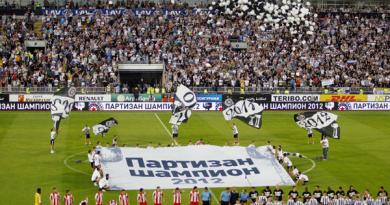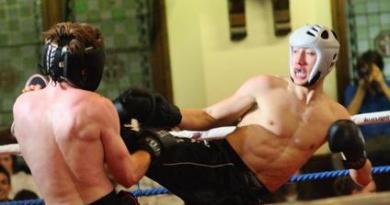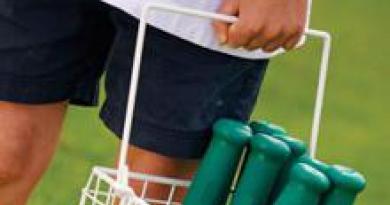On the eve of the 2016 Paralympic Games in Rio de Janeiro Sports arbitration court within 24 hours made a decision on the appeal of the Paralympic Committee of Russia.
On August 7, the head of the International Paralympic Committee, Philip Craven, during the Olympic Games in Rio de Janeiro, announced at a special press conference that Russian Paralympic athletes were not allowed to participate in the 2016 Games in Brazil.
A week later, the RPC filed an appeal against the decision to CAS.
The court session, which started on August 22, did not give answers, and the decision was expected in the first half of the next day. By morning, encouraging information began to appear, according to which the likelihood of a positive decision regarding the Russian team was regarded as high.
However, CAS issued a diametrically opposite decision: the appeal was rejected, the Russian Paralympians will not go to Rio.
The head of the IPC Craven was pleased decision, but at the same time expressed sympathy for the Paralympic team of Russia.
“We are encouraged that the CAS has upheld the IPC decision. Despite the fact that we are pleased with this decision, this day is not a holiday, we sympathize with the Russian athletes. This is a sad day for the Paralympic movement, but also a day of something new. The IPC will now work with IFs to redistribute the 267 Russian Games licenses.
The IPC decision was based on the fact that the committee is an autonomous organization and the RPC is the only member representing Russia. We found that the RPC did not fulfill its obligations under anti-doping rules, therefore, adopted this course of action for the benefit of the Paralympic Movement.
After Rio, we will be working with the World Anti-Doping Agency (WADA) to establish the criteria that the RPC must meet in order to comply with the rules and regain its status. We will also work closely with WADA on the measures that will be taken in relation to the athletes who were mentioned in the McLaren report, ”Craven was quoted as saying by the official website of the IPC.
The Russian side, of course, did not support the decision. In particular, Elena Belkina, head coach of the Russian Paralympic wheelchair fencing team, believes that the Paralympic Games in Rio de Janeiro will lose a lot due to the absence of the Russian team.
- How do you feel about the decision?
“My opinion is this: no one will wait for tears, as we fenced, we will fence,” Belkina told Gazeta.Ru. - No one will forbid us to rehabilitate. That's all. Yes, of course, the world will not see a beautiful level of fencing that is competitive with China, it will lose something from this.
Is this decision related to politics?
- No, they just hide behind politics - this is an absolutely clear division of medals.
Philip Craven, the head of the IPC, is British, and he has not abstracted from his country.
That time they took fourth place, they started the Paralympic movement at the time, and on this moment we are second only to the Chinese. So they want to come back. I repeat: they just hide behind politics, but in fact this is a pure division of medals: “I am in power, I want to divide the medals on my own.”
My opinion may not coincide with the opinion of the Russian Paralympic Committee, but I am sure that in this situation everything is simply covered up by politics, and their internal motives are clear: we are too strong, Belkina said.
Azat Safenko, head coach of the Russian Paralympic shooting team, spoke about his attitude to what is happening.
- How did you personally and the athletes meet this CAS decision?
- The mood now, of course, is not the most rosy, not the most cheerful - the athletes understand that they have been preparing for four years, winning licenses honestly, and now, according to the report of a certain person who indirectly indicates guilt, such decisions have been made.
- Is this decision fair?
- Two instances said that it is fair, although we still do not agree with this, but what can you do about it? At the moment, our leaders are in flight, we will wait for their arrival, we will carry out the work. And while we continue to train.
Do you still hope to get to Rio?
- Coaches are adults, they understand everything perfectly. In theory, getting into Rio is impossible due to the fact that the RCC was excluded from membership in the IPC by the CAS decision, this is the main wording.
Paralympic champion, RCC Secretary General Mikhail Terentyev expressed the opinion that such decisions have a political connotation.
“The decision is fair from the point of view of the letter of the law, after all, this is the Court of Arbitration for Sport,” Terentiev began. — There is, of course, the possibility of turning higher, and, probably, this will be done. But in the spirit of the decision taken, this is unfair. This can be explained by the fact that on the basis of the same report by Richard McLaren, two completely opposite decisions are made (in relation to the Olympic and Paralympic teams of Russia. - Gazeta.Ru).
You can, of course, explain with different arguments - legal ones, for example: the IOC governs sports through federations, while the IPC governs directly, arguments from legal point You can really bring a lot of vision.
However, these arguments are based on rules - rules that allow violation of human rights, the rights of an athlete, who in no way could influence the abuse of the Russian Anti-Doping Agency (RUSADA).”
- Is there still a chance at which the Russian team will still get to Rio?
- Lawyers will look at the CAS decision, what he relied on in making his decision. Further steps will be worked out, but all this will take a long time, and the Paralympics will start very soon.
The situation is similar to the one in which our athletes found themselves.
- Is there any political subtext in this decision?
— Of course. WADA itself says that the investigation is not over, but the decision has already been made. This is an unprecedented case.
You can get acquainted with other news, materials and statistics at Rio 2016, as well as in the groups of the sports department on social networks
The issue of the participation of Russian Paralympic athletes in the 2016 Games in Rio de Janeiro should be decided at a meeting of the Court of Arbitration for Sport (CAS) on Monday, August 22. Despite the active discussion of this situation in the media, not much is said about the Russian para-athletes themselves. DW fills this gap by listing key facts about the Russian Paralympic team.
First starts
For the first time, the Russians took part in the Paralympics in 1988 as part of the USSR team, having missed the previous seven summer and three winter Games. The first attempt did not become triumphant for Soviet para-athletes - respectively, 12th and 13th places in the medal standings for summer and Winter Games.
In 1992, the Joint Team of the Former Soviet Union came to the Summer and Winter Paralympics. She performed more successfully - summer parasportsmen took 8th place, and winter ones could even enter the top three. Subsequently, the years of the winter and summer Paralympics were divorced, and Russia participated in them already as a separate state.
Successful Winter Paralympians
The Russian winter Paralympic team is very successful, it has never dropped below fifth place in the overall medal standings, in 2010 it became second, and in 2006 and 2014 it outperformed all rivals.
Moreover, in Sochi, Paralympic athletes from Russia staged a complete defeat of their competitors, having won three times more gold medals than Germany, which took second place.
True, after the investigation of WADA, the International Olympic Committee (IPC) suspects that that triumph was not without doping. On 18 out of 19 test tubes with samples of Russians from Sochi-2014 sent for rechecking, the Richard McLaren commission found scratches that may indicate that the samples had been opened.
Progress on Summer Games
At the Summer Paralympics, the Russians do not have such a formidable team. However, with each new Games they rose higher and higher in the medal standings. Only 16th at the Games in Atlanta in 1996, in 2008 in Beijing they broke into the top ten for the first time, rising to eighth place, and in London 2012 they completely became second. However, it would be very difficult to take another step up in Rio - since 2004, the Chinese have not given the first place to anyone. In 2012, China overtook everyone by a huge margin - 95 gold medals against 36 for the Russians, who took second place.
Leaders
The RCC planned to bring a record number of para-athletes to the Games in Rio - about 230 people. A strong athletics team stands out among them, which includes, for example, three-time 2012 Paralympics champions, runners Evgeny Shvetsov and Elena Sviridova, as well as Margarita Goncharova, who managed to add victory in the long jump sector to two gold medals in running.
Context
One of the favorites in Rio could also be the traditionally strong Russian 7x7 football team (gold in Sydney 2000, bronze in Athens 2004, silver in Beijing 2008 and again gold in London 2012). Perhaps, main star Summer Paralympic team of Russia - eight-time Paralympic champion, swimmer Oksana Savchenko, who beat world records in Beijing and London.
What about doping?
WADA reports for 2013 and 2014 allow us to assess the situation with doping in the Russian parasport before the latest revelations of the McLaren Commission. During these two years, 86 anti-doping rule violations were revealed in the entire parasport, a quarter of them (22 cases) were at the expense of the Russians.
However, in the Paralympic sports, Russians in 2013-2014 came across doping only four times (1 case in athletics and 3 in severe) against a total of 43 violations in sports under the jurisdiction of the IPC. Data for 2015 has not yet been published, and in the earlier period, WADA did not post such statistics.
See also:
-
Introduction to the history of Brazil
The opening ceremony of the Olympics started at two in the morning Moscow time. Hundreds of dancers ran out to the arena of the stadium to the music with powerful multimedia support. The show symbolically told the history of Brazil from the moment of the landing of the Portuguese colonists to the present day.

Bright opening of the Olympics in Rio
Light and sound attack
The lights in the stadium dimmed. Spectators held their breath... The darkness was torn apart by dazzling fireworks! The show was watched by about three billion viewers around the world. Brazilian directors, designers and artists managed to avoid unnecessary pathos by touching on some socially important topics. This is not surprising, because they have the whole tradition of the Brazilian carnival behind their backs.

Bright opening of the Olympics in Rio
dance performance
The spacious space was suddenly filled with dancers in futuristic costumes, moving in unison to rhythmic music. According to the concept, the show showed Brazil as a country with a rich history and modern culture, built like a mosaic from the heritage of different peoples. And dance is one of its main components.

Bright opening of the Olympics in Rio
Less technology, more humanity
Unlike Summer Olympics in Beijing and London, the opening of the Rio Games looked less technological and more human. Though there were laser beams and an electronic beat, it all blended gracefully with the lyrical melodies of the acoustic guitar and string group. Relative minimalism justified itself - the show attracted attention.

Bright opening of the Olympics in Rio
Houses from underground
The audience is breathtaking - like mushrooms from the ground right in front of their eyes grows a whole city! Acrobats jump and somersault on the roofs of closely standing nearby houses, an incredible number of people dance. The urban element of the show symbolizes the famous Brazilian favelas, many of which date back to the 1970s.

Bright opening of the Olympics in Rio
Main director
The main director of the opening show of the Olympics was the famous Brazilian filmmaker Fernando Meirelles, who received worldwide recognition after the film "City of God" (2002). That film told about the difficult life of the slums of Rio de Janeiro. Social and environmental issues were clearly visible at the opening of the Olympic Games.

Bright opening of the Olympics in Rio
Girl from Ipanema
Brazilian supermodel Gisele Bündchen in a silver dress entered the stadium to the sounds of the bossa nova song "The Girl from Ipanema" (Garota de Ipanema). A melody that is literally familiar to the entire planet - after all, this is one of the most famous songs in the history of pop music. Singer Paulinho da Viola then sang the Brazilian national anthem.

Bright opening of the Olympics in Rio
Music that drowns out the protest?
While 78,000 spectators watched the show, a protest against the Olympics in Brazil was held near the Maracanã stadium. Even before the start of the ceremony, the organizers announced that the music would be made louder on purpose to drown out the screams and whistles of the protesters, and the stadium was taken under heavy police protection.

Bright opening of the Olympics in Rio
Save clean air
The culmination of the show is the entry into the arena of a boy leaning over a small green sprout. It is in Brazil in the Amazon region that the world's largest forest is located, which, however, is threatened with destruction. Preserving the lungs of the Earth and clean air on the planet is the task of all mankind! This is the message of the creators of the show. The same can be said about the Games themselves, marred by a doping scandal.

Bright opening of the Olympics in Rio
The Olympics have begun!
An hour later, the show ended, and the Olympic teams, representing about two hundred countries of the world, began to enter the arena. In general, the opening ceremony lasted four hours. The authorities of crisis-ridden Brazil did not spare about 9 million euros for its creation. In the photo - the German team and its flag bearer, the famous ping-pong master Timo Boll.
The International Paralympic Committee refused to allow the Russian team to participate in the Paralympics in Rio de Janeiro. The team is suspended from the Games in full, the decision can be challenged within 21 days
The Russian team will not participate in the Paralympic Games in Rio de Janeiro: The International Paralympic Committee has suspended the team in its entirety from participating in these competitions. It is reported by Reuters with reference to the statement of the President of the International Paralympic Committee (IPC) Philip Craven.
The national team will not go to the Paralympics, as the IPC has suspended the membership of the Russian Paralympic Committee (RPC). “We spent a lot of time studying the McLaren report, listened to the Russian side, but they could not prove their case,” Craven said and announced the suspension of the Russian Paralympic Committee.
The head of the IPC said that the anti-doping system in Russia is broken, corrupt and completely compromised. According to Craven, the IPC had no other solution than to suspend the Russian Paralympic Committee. He also promised that all doping tests Russian athletes from the 2014 Paralympics in the next few months will be tested. Craven also stated that there was evidence that during the Paralympics in Sochi there were substitution of doping samples.
An IPC statement released later said the Russian government had failed its athletes catastrophically. “Their medals were placed above moral values, and this seems disgusting to me. The total corruption of the anti-doping system is contrary to the rules and strikes at the very heart of the Paralympic sport. This approach demonstrates a blatant disregard for the health and well-being of athletes,” Craven said.
“Their thirst for glory at any cost has seriously harmed the unity and image of sport in general and has led to devastating consequences for the Russian Paralympic Committee (RPC) and Paralympic athletes,” said the head of the IPC.
Russia will file with the Court of Arbitration for Sport (CAS) in Lausanne from the competition in Rio de Janeiro, Sports Minister Vitaly Mutko said. “We are filing a claim with CAS. We will fight for our Paralympic athletes,” the minister said. The decision of the IPC can be challenged within 21 days.
Earlier on Saturday, August 6, the Guardian newspaper wrote that it had already been decided and the International Paralympic Committee had only to announce it. The basis for the suspension of the Russian Paralympic team was the report of Richard McLaren, which stated that doping violations allegedly occurred systematically in Russia.
The report of the independent commission of the World Anti-Doping Agency (WADA), led by Richard McLaren, was published on July 18. In it, Russia was actually accused of creating a state system for the substitution of doping samples. The International Olympic Committee has decided to allow the Russian Olympic team to compete, subject to a number of strict conditions.



